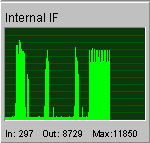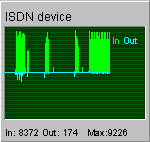This information can be displayed either in plain text, or in graphical format (either bar-charts, line-charts or, my favourite, a histogram view).
So, in a way, it's just another (simple) network monitor.
What makes it unique (at least in my opinion) is that it doesn't require much software to be installed on the computer to be monitored (aside from a script or c-program, some settings in /etc/inetd.conf and /etc/services and of course a web-server to serve the applet). But no libs, no X-Server or anything like that.
Features
lrpStat currently supports the following features:- Displays graphs of network usage of a given interface
- Shows wether an ISDN-link is online or offline
- lrpStat can trigger actions on the router (for example dial and hangup)
- Shows cpu-usage of the router
- Can be run either as a Java applet (inside a browser) or as a standalone application
- Very small footprint (in memory as well as cpu-time) on the router
Actions
For each monitored device, you can specify any number of "actions". These actions can be either opening a port to the computer the data is coming from (and of course, you can specify which port that is) or fetching an URL from the computer the data is coming from. The actions can be accessed by right-clicking on the device the actions are defined for (context menu).For example, you can use this functionality to bring up an ISDN-Device/Modem and to force it to hang up.
So, if you specify the actions:
<PARAM NAME=DEV1_ACTION0 VALUE="online;OPEN 60180">
<PARAM NAME=DEV1_ACTION1 VALUE="offline;OPEN 60181">
and your /etc/inetd.conf looks like this:
online stream tcp nowait root /usr/sbin/tcpd /sbin/isdnctrl dial ippp0
offline stream tcp nowait root /usr/sbin/tcpd /sbin/isdnctrl hangup ippp0
(and "online" and "offline" are specified in /etc/services as ports 60180 and
60181) you can trigger dialing/hangup via the applet/application.
This is great for people like me, who don't trust autodial. Besides, it's fun to see Microsoft applications desparately trying to connect to some server, the first time they're run after being installed.
It seems like this works only with 2.2.xx (and also 2.4.xx) kernels, since the output of /proc/net/dev is different with 2.0.xx kernels. If somebody has an idea how to get the information about transferred bytes for a specific interface on a 2.0.xx kernel, please let me know.
Download the current release
lrpStat Version 0.13Beta:


